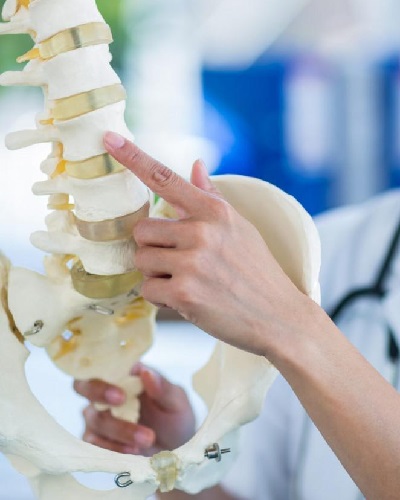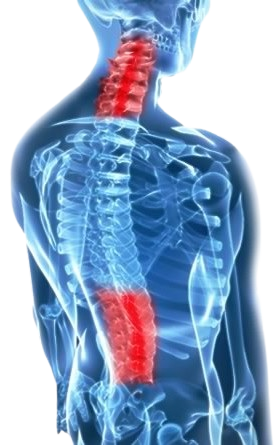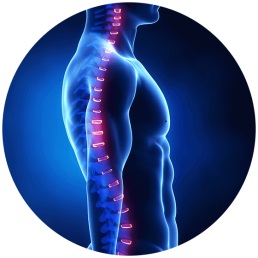Degenerative Disc Disease Symptoms & Treatment Options
Our spinal discs, located between each vertebra, play an important role in having a healthy and flexible spine. Operating as shock absorbers, they facilitate the fluid, pain-free movement of our spine through a variety of daily activities. With their continuous and daily use, these discs can develop signs of wear and tear. Loss of disc height, flexibility, and lubrication can occur. Referred to as degenerative disc disease, this condition can cause pain and numbness in the spine and limbs.
Although “disease” is in the name, degenerative disc disease is less of a disease and more of a gradual condition that develops naturally over time as we age. In severe cases, degenerative disc disease can lead to debilitating symptoms that keep people from participating in life’s daily activities. This translates to lost time with family, inability to participate in one’s favorite pastimes, and missed days at work.
Symptoms of Degenerative Disc Disease
Degenerative disc disease is a common condition affecting millions of individuals in the U.S. every year. Some cases of degenerative disc disease appear as early as age 30. More typically, however, symptoms occur later in life and can depend on an individual’s lifestyle or activity.
Our team has years of training and expertise in providing patients with thorough examinations, accurate diagnoses, and effective treatments for disc problems. Our collaborative team will work with you to assess your options and provide you with viable alternatives for relief and lifelong injury prevention. Schedule a consultation with Dr. Martin, today!
Consequences of Degenerative Disc Disease
Degenerative disc disease is a common condition affecting millions of individuals in the U.S. every year. We provide our patients with thorough examinations, accurate diagnoses, and effective treatments for disc problems.
Our collaborative team will work with you to assess your options and provide you with viable alternatives for relief and lifelong injury prevention.
Possible Consequences of Degenerative Disc Disease
If left untreated, sustained inflammation, loss of shock absorption and support, and loss of height between the vertebrae can lead to increasingly more severe conditions that may require surgery or could permanently compromise the structural integrity of the spine. Some of these possible conditions include:
Bulging or Herniated discs: Discs can bulge and even herniate, or break open, when their structural integrity is compromised by degeneration. Furthermore, these damaged discs can press on nerves, intensifying pain and related symptoms.
Bone Spurs: When our discs degenerate and lose their height, and a herniated disc can calcify and become a bone growth or spur. Bone spurs are growths that develop on existing bone, often occurring at points of friction and inflammation and damage cartilage. These bony protrusions are your body’s attempt to create stability and decrease inflammation from friction. Unfortunately, bone spurs can press on nerves and cause congestion in the spine.
Facet Joint Pain: When a degenerated disc loses its height, this phenomenon can lead to a reduction in the normal and necessary space between your vertebrae. This may cause the facet joints to rub against each other in an abnormal fashion, leading to increased friction, damage, excess swelling and pain. Nerve compression can also occur, resulting in pinched nerves or local scarring.
Spondylolisthesis: Spondylolisthesis occurs when instability in the spine causes one vertebra to slide forward over the vertebra beneath it. Degenerative disc disease can cause the instability that leads to this slippage but more often a combination weakness of connecting joint bone associated with cartilage damage can lead a slipped spine.
To avoid any of these more severe conditions, seek medical advice today regarding your degenerated disc. We can assist you in the recovery process by providing an individualized approach to spine care. We collaborate directly with you to address your spinal pain and avoid future complications!
Some Symptoms Associated With Degenerative Disc Disease Include The Following:
- Localized pain at the site of the affected disc, ranging from a minor ache to debilitating pain
- Radiating pain or numbness to the limbs as a result of lost disc height or pressure on nerves
- Variable levels of pain and discomfort that can intensify for days, weeks, or months at a time
- Pain that disappears entirely for a prolonged period of time before returning
- Pain while sitting or reclining that is relieved by standing or changing positions
- Stiffness and difficult or painful mobility due to inflammation surrounding the damaged disc
- Weakness or stiffness in the lower extremities as a result of nerve damage and inflammation
More about Dr. Matin
Degenerative Disc Disease Symptoms & Treatment Options
Degenerative disc disease pain can be treated by Dr. Martin, give us a call to schedule an appointment.
We will provide different options of treatment.
Pain control
Over-the-counter and stronger prescription pain relievers will often be suggested and prescribed. Other options include corticosteroid medications and rest. Upon improvement a targeted program of physical therapy will aid a facilitated return to routine or regular activities.
Spinal or Nerve decompressions
When degeneration of cartilage becomes significant and there is measured component of nerve pressure, sometimes your surgeon might need to open up normal spaces or spinal capacity to avoid persistent nerve compression and permanent loss of function.
Spinal Stabilization and Fusion
Degenerated discs can produce inflammation, spur formation and if progressive can lead to instability or excess motion of joints. On occasions when abnormal motion is diagnosed, proper stabilization of the spine will provide long term symptom relief.
Disc Replacement
For some people with disc degeneration, a more functional approach of removing damaged cartilage and replacing them with “normal motion resembling devices” the so called artificial disc replacement device, will provide relief without compromising significantly the normal mobility of the segment, allowing patient to return back to normal activities faster.






